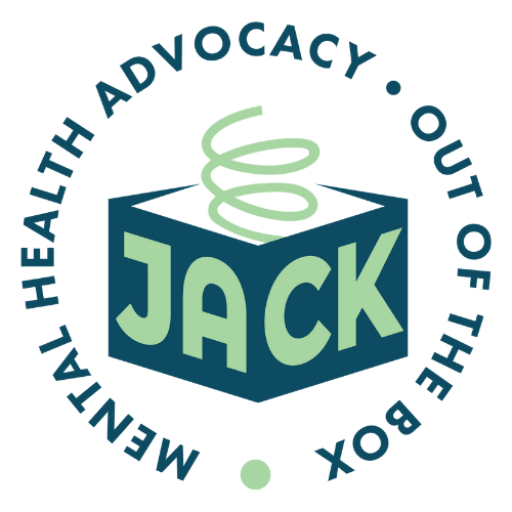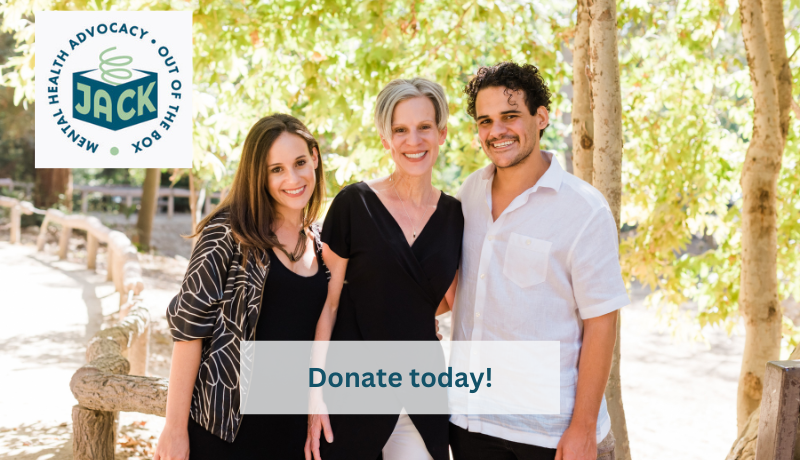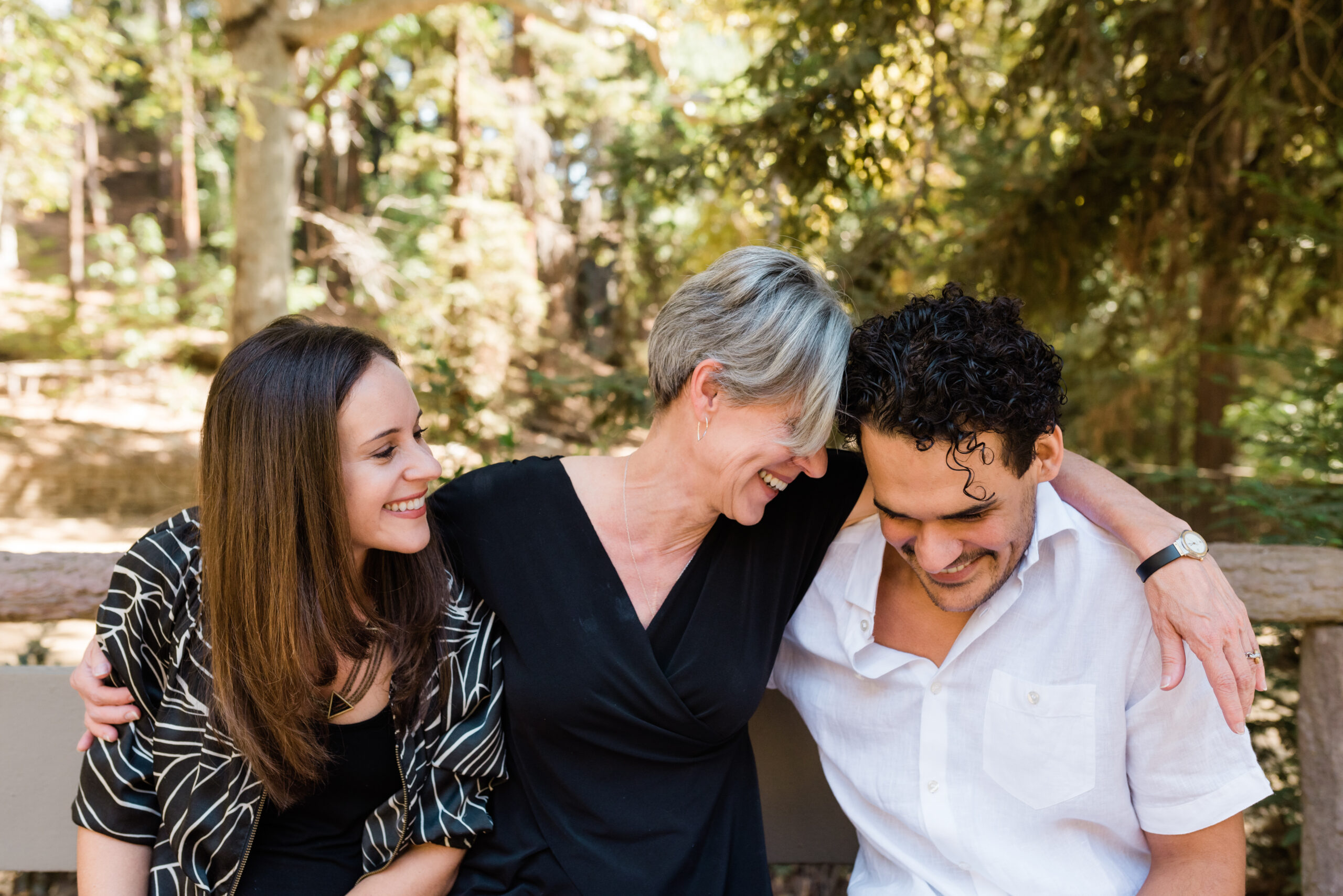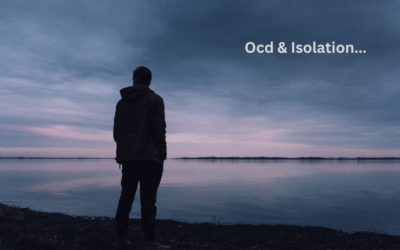I learned I could have patience and trust that things would improve over time.
If you knew me, you would know that I have struggled with anxiety to varying degrees since I was a young child. I experienced my first panic attack in the second grade when the substitute teacher gave me detention in Catholic school for drawing in class. Looking back on my early childhood, OCD (Obsessive Compulsive Disorder) was the culprit, but we were unaware it was the insidious foe I was fighting. As a teenager, I had counseling and saw a psychiatrist for medication; however, my OCD was not diagnosed.
My OCD Story of Hope and Recovery
In addition to my struggles with anxiety, my mom suffered from severe depression during my childhood. Then, when I was 16, my mom hit rock bottom and left my dad. My parents’ divorce understandably exacerbated my symptoms, and the remainder of high school was an emotionally challenging time. Thankfully, college was like a breath of fresh air. I had a new start, and my confidence soared. College was an exciting, rewarding, and happy time, and I could pursue many of my goals and dreams, which gave my life great joy, purpose, and meaning.
After graduation, I followed my dreams of moving to Washington, DC, for graduate school. Unfortunately, it also brought on the most intense battle yet with my OCD. Although I struggled, I clung to my faith, gritted my teeth, and persevered by God’s grace. Thankfully, I could function at a high level and benefitted from bi-weekly counseling and a medication change, allowing me to complete graduate school with honors.
Spike in Anxiety
I began my career and married my sweet husband in 2001. My OCD was managed for nearly fifteen years thanks to Prozac, and I lived a life of relative ease and much joy, with only occasional bouts of mild anxiety. My husband and I were raising our two daughters, and life was good. Until it wasn’t. I hit menopause in 2019, bringing me a new set of challenges. I began to notice a spike in my anxiety and OCD, which worsened as time passed. It was at that time that I started seeing an OCD therapist weekly. I put all my efforts into ERP (Exposure Response Prevention), a new type of therapy for me, as I had only done CBT (Cognitive Based Therapy) previously.
In addition to the ERP therapy, I was experiencing “Prozac poop-out.”
I started down an exhausting dead-end path of trying one medication after another to get my OCD and panic back under control. My life had hit an all-time low, spiraling out of control last summer, as I could hardly leave my house due to the intensity of the panic and OCD. I had hit rock bottom, and out of desperation, I enrolled in a 6-week virtual intensive outpatient program for OCD and anxiety beginning in August. I hoped this would answer my prayers and deliver my way out of all the pain and misery.
OCD was the first thing I woke to and the last thing I thought about before I fell asleep.
When the Program Doesn’t Work
The program was indeed VERY intensive, yet I persisted and gave it my all. I showed up each day, five days a week, for 6 hours, plus doing ERP assignments for homework each night and on the weekends for six weeks. Unfortunately, the longer I participated in the program, the wearier I grew, and my symptoms worsened. In addition, I lost weight due to the stress, and although I had always wanted to be a size 2, this was not the way to do it!
My sleep patterns were erratic, and I was now experiencing physical manifestations of anxiety, including burning sensations in my chest, arms, and hands. The program was incredibly legalistic and was very much a “one size fits all” approach. My husband was instructed not to provide reassurance or comply with their process. Of course, this put strain on my most important relationship. Finally, on the last day of the six weeks, I was told by the program’s psychiatrist, “You are just not getting this, Christie, and you will be back.”
A New Therapist
I felt like a failure and was beside myself with sadness, grief, frustration, and confusion, not to mention severe OCD and anxiety. My health anxiety was now morphing into self-harm OCD, plaguing me night and day. It was the first thing I woke up to and the last thing I thought about before I fell asleep each night. I reached out that very day to a contact I had in the Jacksonville OCD group. She had prayed for me each day, as we shared the same faith, and she was part of my inner circle. My contact got me in touch with a friend who listened to my cries of desperation and told me she felt there was someone she knew who could offer a different treatment approach. She suggested a provider and received a call back that evening.
That communication changed the trajectory of my life. For the first time in over a year, I felt heard, understood, and perhaps most importantly, validated! On the other end of the line, I listened to the voice of someone who possessed great kindness, compassion, wisdom, and understanding.
Lori, my new therapist, could offer me something I could not give myself, hope. She was well acquainted with the program I had just completed. I was not the first person she had encountered who did not benefit from an intensive program. And this wasn’t Lori’s first rodeo in doing damage control. The comment that most stuck with me in that conversation was, “Christie, you did not fail the program. Unfortunately, the program failed you.” I finally had hope that other treatment options were available, and together, Lori and I would not stop until we found the correct alternatives and answers to help me reclaim my life.
I-CBT Clicked for Me!
I recently read online about a new type of alternative therapy to ERP known as I-CBT (Inference based Cognitive Therapy). Ironically, this was one of the types of treatment Lori used in her practice with great success. Once I began engaging in this new treatment protocol, things finally clicked for me. Finally, I could trust who I knew myself to be. OCD loves to lie and tell us we are someone that is the complete opposite of who we are. This disorder loves to attach itself to things that matter most to us. Marinating in these dreadful thoughts until habituation only reinforced the lies of OCD in my mind.
In learning I-CBT, I could now see that these thoughts couldn’t be further from the truth! I could trust that I am who God created me to be: someone with a strong faith in God, myself, and my recovery. I didn’t want to kill myself or harm myself in any way. Indeed, I was the exact opposite of that person. I valued my faith deeply, in addition to my life and many roles as a devoted wife, mother, daughter, sister, and friend. And I felt a great sense of purpose engaging with my church and community. Slowly I learned that obsessional thoughts did not define me and were not a reality nor a reflection of who I was.
Understanding the Triggers
I better understood my triggers in my work with Lori and how to not “cross the bridge” into obsessional mental stories. I was learning to stay in the present moment, and I could handle the obsessive thoughts, and my doubts would eventually pass. My ruminations came from my “vulnerable self.” My fears often came from childhood trauma from my mother’s emotional unavailability due to her mental health struggles. I could see how my mind had gotten tangled up in the lies of the vulnerable self. Additionally, freedom from the lies would happen slowly over time as I continued re-training my brain.
A Toolbox Full of Skills
In addition to I-CBT, I was learning other excellent skills to add to my toolbox. This included mindfulness, meditation, self-compassion, gratitude, willingness, and ACT (Acceptance Commitment Therapy). As a result of practicing these tools, I slowly learned that the pain and discomfort don’t have to hijack my life. I didn’t have to fear that these thoughts, pain, or unpleasantness I might be experiencing would last forever. Instead, I could have patience with myself and trust that things would get better over time. Lori taught me the warning signs of getting caught in the obsessional “bubble” and how to see myself in the act, slow down, and re-direct my thinking. She taught me when and how it is essential to have a plan/problem solve versus submitting to acceptance at the moment to lessen the pain.
In Conclusion, I Believe…
I started seeing Lori on September 12th of this year. My intake YBOCS (Yale-Brown Obsessive-Compulsive Scale) score was as high as you can score, “40.” Three months later, on December 12th, I re-took the YBOCS with a score of “10,” showing significant improvement! If you are still reading this, thank you from the bottom of my heart for listening to my story. I am grateful for my strong faith, amazing therapist (Lori), and incredible family and friends.
If you or someone you love suffers from OCD and a related anxiety disorder, I want you to know that you are never alone on your journey and that there is always hope! While it might take time to find the proper treatment, you are worth it! I believe you will find help if you never give up because I am living proof of that! So, I am rooting for you on your healing journey. Furthermore, I sincerely desire that, in telling my story, many more OCD sufferers will find hope and recovery.









